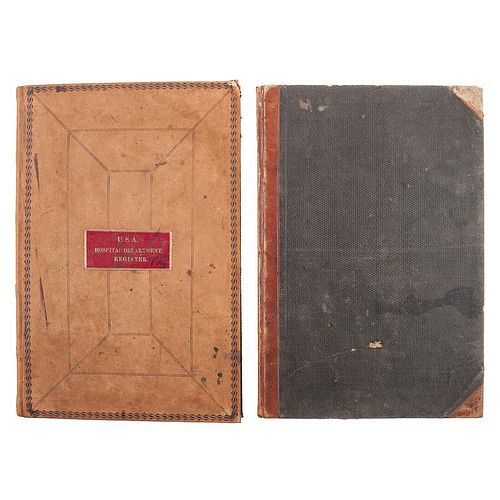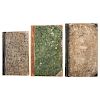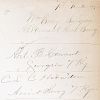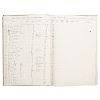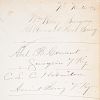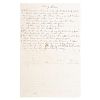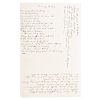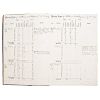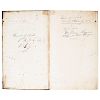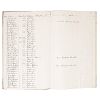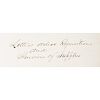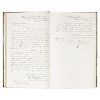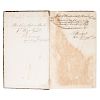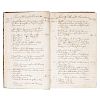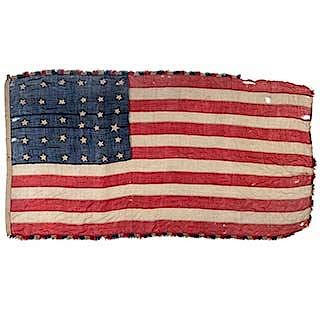Civil War, 7th Kentucky Infantry (Union), Set of Five Regimental Medical Record Ledgers
About Seller
6270 Este Ave.
Cincinnati , OH 45232
United States
With offices in Cincinnati, Cleveland and Denver, Cowan’s holds over 40 auctions each year, with annual sales exceeding $16M. We reach buyers around the globe, and take pride in our reputation for integrity, customer service and great results. A full-service house, Cowan’s Auctions specializes in Am...Read more
Two ways to bid:
- Leave a max absentee bid and the platform will bid on your behalf up to your maximum bid during the live auction.
- Bid live during the auction and your bids will be submitted real-time to the auctioneer.
Bid Increments
| Price | Bid Increment |
|---|---|
| $0 | $25 |
| $500 | $50 |
| $1,000 | $100 |
| $2,000 | $250 |
| $5,000 | $500 |
| $10,000 | $1,000 |
| $20,000 | $2,500 |
| $50,000 | $5,000 |
| $100,000 | $10,000 |
About Auction
Nov 17, 2017 - Nov 18, 2017
Cowan's Auctions dawnie@cowans.com
- Lot Description
Five ledgers plus 26 individual Surgeon Report sheets.
The individual Surgeon's Morning Regiment Reports list dead, discharged, and sick in Hospital or in Quarters. Each of these individual report slips is filled in with the daily health statistics of the regiment by company, regiment, and (often) the location, then signed by the appropriate surgeon. The morning reports are from a variety of regiments because Dr. A. B. Conant at that time was both the regimental surgeon of the KY 7th and also the brigade surgeon of the 1st Brigade; other regiment's surgeons in that brigade used the report slips to transmit their daily statistics to Dr. Conant. During the war, after the statistics were transcribed (into Ledger #5), Morning Report slips could be discarded or sent up as a copy. Other represented units are the 42nd Ohio, 37th Illinois, 23rd Iowa, 25th WV, and the 35th Wisconsin.
The 7th Kentucky (originally designated the 3rd Kentucky, thus sometimes called "the old 3rd") Infantry was mustered in at Camp Dick Robinson, September 22, 1861, and took part in the following engagements & operations: Cumberland Gap Campaign, Red Bird Creek, Ky., Richmond (Ky.), Sherman's Yazoo Expedition, Chickasaw Bayou & Chickasaw Bluff, Fort Hindman, Arkansas Post, Milliken's Bend, New Carthage, Hard Times Landing, Battle of Thompson's Hill at Port Gibson, Champion's Hill, Big Black River Bridge, the two frontal assaults on Vicksburg, Siege of Vicksburg, advance on and Siege of Jackson, and other lesser actions. Additional actions or postings were at Camp Wild Cat, New Orleans, Plaquemine, Baton Rouge, La., mouth of White River, & others. On their battle flag are listed the following battles: Cumberland Gap, Perryville, Arkansas Post, Black River Bridge, Jackson, Richmond, Chickasaw Bluff, Champion's Hill, Vicksburg, and Sabine Cross Roads. The regiment mustered out October 5, 1864. The regiment lost 319 men during their time of service: 3 officers and 40 enlisted were killed or mortally wounded; 2 officers and 274 enlisted died from disease.
Ledger #1: Folio (16 in. tall) stamped leather with red label center of front, gilt outlining and lettering “U.S.A. Hospital Department Register.” Pre-printed pages with columns for "name, rank, Regiment or Corps, Company, Complaint, Admitted, Returned to Duty, Deserted, Discharged from Service, Sent to General Hospital, On Furlough, DIED, and REMARKS."
Contained here are the hospital records of the 7th Kentucky Volunteer Infantry Regiment from February through September, 1864. Entries in this ledger were made when soldiers were admitted to the hospital at the regimental or brigade level. Recorded locations of the surgeons and patients found here include: Baton Rouge, Louisiana; Morganzia, Louisiana; St. Charles, White River, Arkansas; on Board Str. (steamer) Rose Hambleton, Steamer Kentucky, Mouth of White River, Pritchettsville, Arkansas. Many of the battle wounds occurring in the 7th Kentucky happened at the Battle of Richmond, Ky., and by Grant's unsuccessful frontal assaults on Vicksburg from the east on May 19th and May 22nd, 1863. These initial failures resulted in Grant's change in strategy to the famous and successful siege of Vicksburg, allowing the Union to gain complete control of the Mississippi.
The front free endpaper includes the written names of 3 surgeons in 3 different hands: The first appears on 3 lines: "7th Ky., Wm Berry, Surgeon., A.B. Conant Ass't. Surg." These are in the same handwriting as the 7th Ky. written on the cover label. Next appears: "Abel B. Conant, Surgeon 7th Ky." (tragically, both of these surgeons died before the year 1864 was finished). Finally appears: "C.L.C. Herndon, Assist Surg 7th Ky." It is likely that Dr. Berry started the book and wrote both his and Dr. Conant's names. When Dr. Conant was promoted to Surgeon on 5/10/64 (relieving Berry, who resigned on 4/30/64, likely due to poor health, since he was known to have been granted a sick leave of 20 days on 8/27/63, and ultimately died in Fall, 1864), he probably wanted the ledger to reflect his promotion and repeated his name in his own hand. Herndon may have been especially sensitive about this, as the nps.gov website records Herndon's rank in as Private and rank out as Surgeon! His promotional route was apparently from Private to Hospital Steward to Asst. Surgeon to Surgeon. Herndon was known to have been promoted to Asst. Surgeon from Hospital Steward on the same day that Conant was promoted, 5/10/1864. The basis of Herndon's medical training outside of the war is unknown; whether he was actually a physician is uncertain. Dr. Abel Blood Conant is known to have graduated from Columbia University, NYC, in medicine in 1862. Conant was born in NH on 1/5/1837 and was promoted to Surgeon 6/10/1864 after acting in that capacity for months following Dr. Berry's illness. Having served his full term, he was honorably discharged 9/24/64 but died tragically later that year from diphtheria 12/22/64, possibly related to a cold caught enroute home from his service in Louisiana. A memorable obituary appears in the NY Medical Journal of that year.
Common complaints listed include Syphilis, Diarrhea, Int. Fever, Debility, Bronchitis, Erysipelas, Rheumatism, Lumbago, Emesis, Constipation, Malaria, Gonorrhea, Furuncle, Int. Cephalalgia, Sore throat, Influenza, Dysentery, Bruise.
More unusual complaints listed include Ozoena (which means mucopurulent rhinitis), Old wound, Measles, Febris Intermitt, Icterus (jaundice), Mumps, Bruised foot, Hepatitis, Rhinitis, Nephritis, Gunshot Wound, Boils, Smallpox, Wound, Lacerated Wound, Incised Wound, Punct. Wound, Shingles, Enlarged Spleen, Sore feet, Hemorrhoid, Drunkenness, Pain in head, C. Synovitis, Effect of Gun shot Wound in Knee joint, Hypertrophy of Heart, Injury to Side, Swelled neck, Night blindness, Pneumonia, Parotitis, Splenitis, Bubo, Cholera Morbus, Scald, Sore eyes, Cong. Spleen, Swelled Symphasis (sic), Poison Vine, Colic, Drunk, Piles, Inf. of Stomach, Lacerated Nostril, Wound of Cornea, Syph Rheumatism, Felon, Inguinal abscess, Haemoptysis, Stone Bruise, Congestion Liver, Varicella, Tonsilitis, Conjunctivitis, Sciatica, Scrofula (tuberculous lymph nodes), Otalgia, Chemosis, Poisoning from Poison Vines, Typho Mal Fever, Phagadenic Syphlitic ulcer of penis, Poisoning from Rhus Radicans (poison ivy).Ledger #2: 12 x 7.5 in. size, .75 in. thick. Hardbound half split leather with a swirl design of the outer board covers and page edges. One hundred (100) pages plus front endpapers have entries, most often the entire page. Some entries in tabular form, with some spontaneous prose paragraphs or notations.
First pages list the arrests by Provost Guards from August 31 – October 29, 1863 – not surprisingly, most are for either being without a pass or sidearm, or drunk and disorderly.
Then follows lists of diseases, summaries beginning November 1861, (many set up like the morning reports, but manuscript (maybe no ledgers were pre-printed yet, or they did not think they were needed – it was still early in the war). 59 leaves filled in at least partially.
Among some of the common listings were febris intermittens (acute) and Febris Remittens (chronic) fevers. "Debility" is common – chronic fatigue, exposure, frustration, combat conditions, diet deficient in calories, vitamins, minerals plus chronic diarrhea, other infections, probably all played some role in this condition, which may have also been a convenient “catch all" for inexperienced and overwhelmed surgeons.
On one page [page before list for February 1863], the Surgeon notes: “The causes in my opinion which generalize as much disease were over crowding upon the transports where the greater portion of the month was spent. The transports were totally unfit to carry so many men as were placed upon them. They were without facilities for cooking & almost entirely unprotected from the sudden changes of the weather.
The regiment also suffered greatly from want of clothing & blankets. There were no issues of fresh meats or vegetables & in many instances the men were compelled to eat uncooked rations, consisting of salt pork & beef, hard bread, coffee & sugar with some rice & beans: several cases of scurvey appeared. The diarrhea which prevailed was obstinate, and resisted all treatment until a change of dietitic [sic] arrangements were established. When mercurial had the happiest effects for the time but it was next to impossible to prevent its frequent occurrence often becoming chronic & often ending fatally."Ledger #3: 8.5 x 1.3.75 in. – three-quarter leather over marbled paper; pages not preprinted. Columns drawn in red ink on left hand page: Date, Name, Rank, Duty, Disease with Comments on facing page. Front pastedown signed in ink: "Register of Sick, 7th Regt Ky Vol Inf. 1863."
This ledger represents the sick call book and an entry would be made each time that a soldier presented himself for sick call. On each left hand page are columns for the date, name, rank, duty, and disease (diagnosis). The right hand facing page is used only for remarks. A 2pp spread was used for each company, A through K (there was no Company J), which was marked in the left upper corner with a large capital letter. The first 2 pages are Company A, pages 3-4 for Company B, and so on through Co. K. The ledger begins with January 1863.
After the January 1863 entries end, the whole process begins again on a fresh page (after Co. K) for February (& subsequent months), starting again with Co. A. Most soldiers are returned to duty, in which case "duty" (or ditto marks) are made in the "Duty" column. Usually, if not returned to duty, a notation under remarks indicates the disposition, for example, Regimental Hospital, or Gen'l Hospital Memphis, or Died (and the date). The last month covered is August 1863.
Beginning with the date of May 1st (date of Battle of Thompson's Hill at Port Gibson, Mississippi, often called the beginning of Grant's Vicksburg Campaign), it becomes clear that the regular routine has been discarded, the action just too busy for more than cursory note-taking, not even a body part or diagnosis is recorded, just name, company, and a rough idea of the date. Following this are 2pp of detailed battle wounds ("Gunshot wound, Ball Right Knee fractured, leg amputated"; "Right chest cavity Died May [no date]"). After the most ferocious battles are over, the ledger returns to routine sick call.
Ledger #4: 13.5 x 8.5 in.; three-quarter leather over marbled paper. Not preprinted. On ffep “Letters orders Requisitions and Invoices of Supplies.” The first 70pp (with 6 blank pages mixed in) of the ledger are filled with orders, circulars, and letters which have been transcribed into this ledger after their receipt by the 7th KY Regiment. Dates covered are from October 14, 1861 through September 15, 1864.
Orders and regulations are the first items copied into the book: 1st – assigning Wm. Berry to report to Genl. George W Thomas for duty in his Brigade; 2nd – duties of Brigade Surgeons (by order of Wm. T. Sherman); 3rd – similar to 2nd, but by order of the Medical Director of the Brigade; 4th – asking Berry to put together a monthly report “if the surgeon who had charge…before you joined it kept any register of the sick.”
It becomes clear reading these orders that the Surgeons were responsible for far more than medical care and record keeping. They were also responsible for camp cleanliness, especially in the cooking area and mess; they were to drill the hospital attendants for one hour each day (except Sunday). Much seems to relate to coordination in carrying litters and stretchers; they were responsible for use of the hospital equipment (such as ambulances); and more.
The last one is November 1, 1861, with partial record July 6, 1863 (only two lines), then starts January 26, 1863, Department of the Tennessee, (under Grant at the time) with Medical Orders No. 1; then 3 leaves skipped, then a series of orders from the “Rear of Vicksburg June 4, 1863.” Many of these orders are asking for more reports, etc. For ex: Order Dated New Orleans, July 27th 1864, item “IV. Surgeons in charge of Hospitals in the Military Division of West Mississippi will furnish this office with a copy of their weekly report with brief remarks upon the prevailing diseases and the treatment adopted; epidemic & contagious diseases; and vaccinations. The number of Laundry laborers & contrabands should be given. Medical Directors of Departments, Surgeons in charge of Military Districts & Post Surgeons in the Military Division of West Mississippi will furnish a semi-monthly consolidation of this Weekly Report, the designations and the details for the various headings of the Reports to be mentioned, for each Regiment and Battery. When the commands are large enough, this consolidation will be made by Divisions."
This is continued through September 15, 1864, then after a blank section, are invoices of medicines and Hospital Items. There are 45 pages overall, plus 3 affixed to rear pastedown. Inventories for the quarter can run four pages.
The Invoices are for what is received from the Medical Purveyor's Office and are usually made out and signed by the receiving Surgeon or Asst. Surgeon, essentially a table and signed statement of what has been delivered and received. While the Invoices are a signed "received" list, the Requisitions are a want list with 3 columns following the list of items: the columns are labeled: "On Hand, Wanted, and Obtained." In these cases, the quantity filled in under "Obtained" constitutes the Invoice. It appeared that the Asst. Surgeon often acted as the Medical Purveying Officer (ie, receiver of the supplies). Sometimes an invoice is for only one type article, more often for dozens of them.
In the quarterly requisition, requests go far beyond medical supplies. This list includes everything from books to paper to pencils, tourniquets, Camphor, Condensed Milk, 3 types of Aether, Chloroform, Morphine, Quinine, etc.
Ledger #5: three-quarter leather over cloth, “Surgeon Morning Reports” on spine, 15.75 in. tall (folio), 68 leaves (135pp) filled out. Pages pre-printed with room for 3 days’ summaries – "Date, Company," columns for “In Hospital, In Quarters (remaining from last report)," taken Sick, totals "In Hospital and In Quarters, Returned to Duty, discharged, Sent to General Hospital, Died, Remaining in Hospital and In quarters, Remarks."
The only names in this ledger are the autographs of the surgeon filling out the headers, either Surgeon William Berry, Asst. Surgeon Abel B. Conant, or Asst. Surgeon C.L.C. Herndon. The number of soldiers reported as Total (Sick) in Quarters varies from a high of 247 on August 7, 1863 to a low of 1 on September 7, 1863 (as the regiment was moving).
The Remarks column contains some interesting insight: the movements of the regiment, the leave of absence for illness granted to Dr. Berry (beginning August 27, 1863), a railroad derailment, a fatal injury from a Provost Guard, and other details.A far more detailed description of these ledgers was provided by the consignor, containing extensive lists of diseases and injuries, a complete transcription of the obituary notice of Dr. Abel Blood Conant from the Transactions of the Medical Society of the State of New York, as read before the meeting of February 1865, and much more. A copy is available for prospective buyers if desired.
A unique record of Civil War Surgeons and their day-to-day workings. Very few of these have survived in private hands.
Stored in two archival grade drop front museum storage boxes with reinforced metal edges. Each box with rechargeable museum dessicant canisters w/instructions. Each ledger in a removable clear Dura-Lar cover for easier handling. Minor repairs to #2 and #5, including archival tape to reinforce hinges. Ledger #1: All 4 corners are bumped and worn, none seriously. The spine and both hinges of the sewn construction are solid. Color of the pages is aged white and foxing is minimal. Overall condition is near fine. Ledger #2: Corners bumped; they appear never to have been covered with the spine material. Overall very good condition; the front hinge to the front free endpaper was torn but has been lovingly reinforced with archival translucent document tape, allowing safer handling without obscuring the autographed end papers. This repair plus the Dura-Lar cover allows handling with reasonable care. The front shoulder and rear hinge are cracked but holding well. Front & rear pastedowns both wrinkled. Minor foxing and inkblots. #3 - Hinges intact; front free endpaper slightly gapped from text block, not freely separated. Corners and edges bumped. Very good readable condition. #4 - Worn on all edges & corners, ~15% of cover sheet missing from back board. Front hinge cracked, otherwise holding well; rear hinge good. #5 - a 7 x 15 mm section of this cloth is missing from the front cover along with two other 3 mm size defects. The upper two corner leathers are missing, the front lower corner is in good condition and the front rear is worn & was split. As acquired, both inner hinges were torn with covers attached by the four twine bindings and shoulders. The front shoulder shows wear and the rear shoulder was cracked for about half its length. The upper corner of the rear free endpaper has been torn off (about 1x1") as has the upper corner of the last ledger page (about 1/2x/1/2"). A nice archival linen tape repair of both hinges has been done. Also, splitting of the lower rear corner and several small peel defects in the spine & covers and the cracked shoulder have been stabilized or restored using archival bonding agent and fragments of peeling leather from this ledger. These, along with the Dura-Lar cover, brings the ledger back to safely readable condition.Condition
Eliminate the Hassle of Third-Party Shippers: Let Cowan's Ship Directly To You!
If you'd like a shipping estimate before the auction, contact Cowan's in-house shipping department at shipping@cowans.com or 513.871.1670 x219. - Shipping Info
-
Eliminate the Hassle of Third-Party Shippers: Let Cowan's Ship Directly To You!
If you'd like a shipping estimate before the auction, contact Cowan's in-house shipping department at shipping@cowans.com or 513.871.1670 x219.
At the request of the buyer, Cowan's will authorize the shipment of purchased items. Shipments usually occur within two weeks after payment has been received. Shipment is generally made via UPS Ground service. Unless buyer gives special instructions, the shipping method shall be at the sole discretion of Cowan's Auctions, Inc.. Cowan's is in no way responsible for the acts or omissions of independent handlers, packers or shippers of purchased items or for any loss, damage or delay from the packing or shipping of any property.
-
- Buyer's Premium



 EUR
EUR CAD
CAD AUD
AUD GBP
GBP MXN
MXN HKD
HKD CNY
CNY MYR
MYR SEK
SEK SGD
SGD CHF
CHF THB
THB